What begins as a claustrophobic study of a restless shut-in’s daily solitude ultimately blooms into an absurdity-tinged story of courage and self-actualisation in the comical and compassionate Love Me Tender.
As the socially stunted Seconda (Barbara Giordano) struggles to conquer her fears and venture beyond her front door, the film’s small world expands to include an array of similarly dysfunctional locals who help our heroine to overcome the traumas of the past in her own endearingly awkward way.
With Love Me Tender screening at this year’s London Film Festival, we sat down with writer-director Klaudia Reynicke to discuss her eccentric new feature.
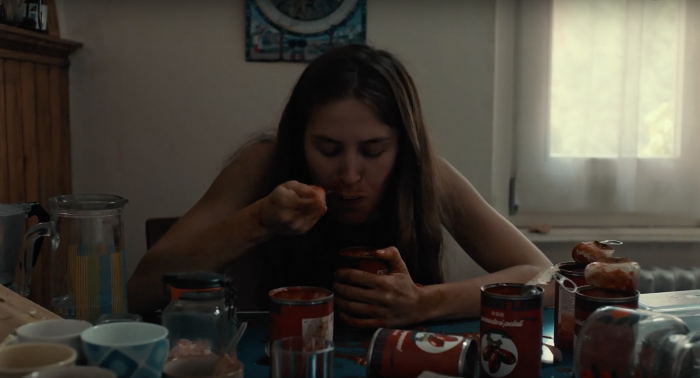
Let’s start with the name of the film: Love Me Tender. What does that title mean to you?
Well, I would say basically two things. The first is that it’s a story about an internal battle where this person Seconda needs to understand how to care about herself, how to love herself. So when I was writing the film, I was always thinking that “love me tender” was something she would like to tell herself.
At the same time, I’m a big fan of kitsch, and I love Elvis Presley, the one from Las Vegas, the copycats, and everything that is a bit out of tone and out of tune. Being part of that world, “Love Me Tender” represents that for me as well. It’s some kind of light into this dark world I’m telling.
What were you aiming to express going into this project?
I wanted to tell the story of a person who is able to resolve a fight, like a superhero, like an anti-superhero in this case. I’m a fan of anti-superheroes. I’m Peruvian. I was born in Lima and I grew up watching El Chapulín Colorado, which was about this Mexican anti-superhero who does everything wrong. I loved it because it made me laugh a lot and he really tried to make it better for people. Sometimes he could, and sometimes he would mess it up and make it worse, and I never found this kind of figure in female characters.
So I always wanted to do a story about an anti-superheroine, but at the same time, it started like a simple drama about an internal battle. So I decided to kind of criss-cross the two so that it would also have a tone that was a bit more particular, that was a bit odd. I call it a pop drama. At the beginning of the film, some people don’t know if they can laugh or not, because it’s kind of funny, but “Can I really?” And it’s meant to be that way. It’s meant to make you feel uncomfortable but then be like, “Yes.”
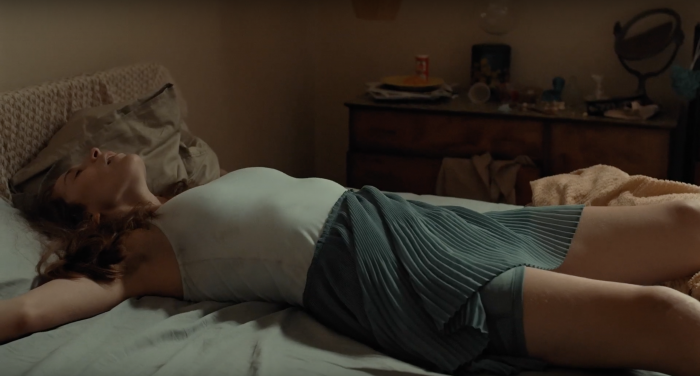
How did the element of agoraphobia come into the film?
Well, because it’s not really specified in the film, we can maybe say she has agoraphobia, or she might be depressed and this is the way she deals with it, or she has extreme anxiety. But I decided to talk about how she could not get out of the house because it’s something that I hear about often that no one talks about. You go on blogs and read about people and what they go through, and a lot of people have problems getting out of their houses, sometimes for months.
In the end, it seems like something that’s there, everywhere. It’s common, but it doesn’t look that common. When you see the film, people are like, “Oh my God, she’s crazy.” But then I have a lot of people coming to me afterwards, like in Locarno or Toronto or here, and being like, “I know what this is because actually I had that for a few weeks or a few months.”
Do you think it’s possible to offer a humorous perspective on mental illness?
No, absolutely not. It’s not a humorous perspective on mental illness. It’s more looking at the courage of a person having a problem controlling her mind and her body, and not being able to control her freedom. So it’s not at all like having sarcasm over an illness, because I think it’s something very serious and you have to take it very seriously. But it’s really more about a person, that internal battle, and being able to try to find a way to be free in some ways.
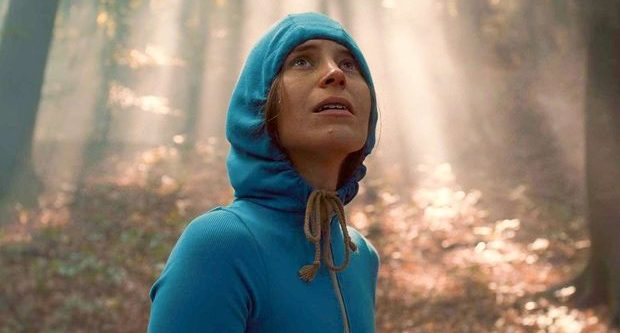
One interesting supporting character is the debt collector, Henry, who harasses Seconda with creepy and threatening phone calls but seems relatively shy, even apologetic in person. How did he end up in the story?
I lived in the United States in Florida for a long time. I studied there from 17 to 25, and at some point, I had a bunch of roommates. One was French and I think he stopped paying some credit card debt that he had. He got in trouble with the bank or whatever and then we had this creepy person calling the house, always looking for him, but in the end, he wouldn’t look for him only. He would insult all of us and tell us what he was gonna do. He was really threatening and we were scared, and at the same time, we would laugh, because it was so insane. I think that got stuck in my mind for so long. Then one day, he stopped calling and we kind of missed him. Where did he go?
For Seconda, I wanted to find a friendship, but an odd one, just like her. The relationship gets so close – because he says those awful things – that it seems like they’ve known each other forever, and when he disappears, she misses him. Of course, when the person comes, I didn’t want to find this cliché man but this nice man who kind of loses it. Everyone kind of loses it in this film, and I like that because I feel that all humans are like this. Sometimes we wanna seem normal but we’re not really. We all have these black-and-white personalities and they show. We have both sides.
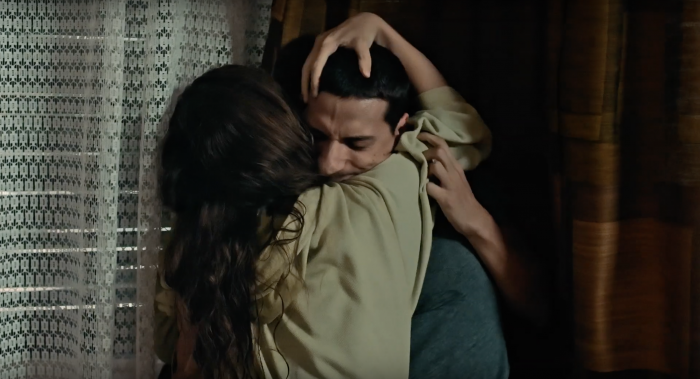
One of my favourite parts is when Santo accidentally knocks Henry unconscious after mistaking him for Seconda, and then moments later, he asks Seconda to help him take Henry to hospital like the two of them are suddenly friends again.
Exactly, and he tells her, “I thought it was you.” He really means it because she asked him to kill her, so he’s really trying to do good. But they’re all a bit grey. Sometimes in films I get very bored because you have black or white, and you’re like, “I don’t believe in this.” When you have grey kind of characters, I feel it’s a lot more like us but we just don’t know it because we’re used to the stories that grandma and mum and father tell us. “There was a big wolf who was bad, and there was Red Riding Hood who was good.” We’re used to that kind of drama and I don’t really agree with it.
Whereas in your film, people often change so quickly.
I feel we are like this. I mean, I can be very nice but I can be a bitch. Anyone can. I hope, at least, because it’s a defence.
The main character’s name is Italian for “Second,” she’s the second child of her parents, and there’s even a little girl whose name is also Seconda – she’s a second Seconda. So I’m curious, what was your intention with this motif of doubles?
The people who watch the film can take away whatever they want and understand it how they want, but when I was thinking about it, to me, this little girl is there to piss Seconda off and get the worst out of her. At the beginning, she really has trouble, and then she has this horrible little girl telling her this really mean stuff. But it’s the little girl who really pushes her to get out of the house when she breaks the window, and even when Seconda goes to look for Santo, she’s the one who says, “You can’t get out the house because you’re crazy,” so she gets out of the house.
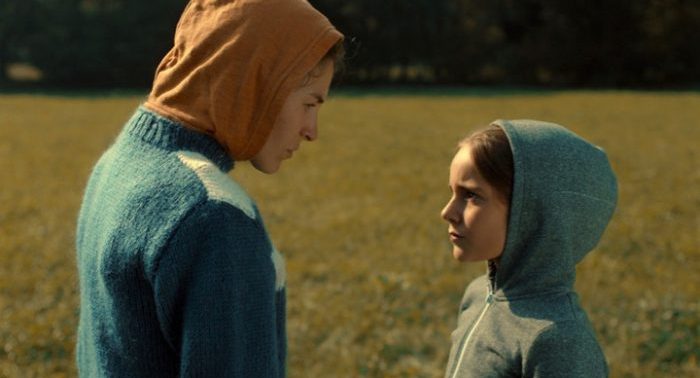
At the end, we realise that Seconda is going back to her past when she sees the little girl and the mother calls her, “Seconda.” She realises it’s her, which is why the internal battle that we have at the beginning of the film of the two people bumping into each other is actually what she’s doing with herself, with her present and with her past. She’s trying to get her past stronger, and her past is asking her to do this when the girl tells her, “Again. I want more.” It’s almost like a boxing coach. That was the idea.
It’s true that some people maybe think it’s the sister. I think that’s the beauty of it, because I wrote something, I put it with sound and images into a certain context, and then some people come and tell me, “Oh, I know what this means.” And every time, I’m actually discovering stuff I didn’t even know. That’s cinema, right?
What’s next for you?
I’m working on a few things. I grew up in three different countries: for ten years in Peru, and then in Switzerland, and then I went to the US, and now I’m back in Switzerland but in the Italian side. So in each of these countries, I wanna do something that is mine. I wanna shoot the next one in Peru, in Lima, which is my city. It’s a story of a family that has to be separated, but with very strange characters as well. At the same time, I’m preparing something that I want to shoot in Florida, because that’s where my Peruvian family lives today.
So I have these two projects, and since I went to Toronto, I also have a lot of new openings coming up in the US. I’m actually going to Los Angeles next month because there is an interest about making something more of Love Me Tender, maybe like a series. That would be a lot of fun for me because I could actually develop the characters more. So there are these three things now, and I’m trying to see which one is gonna come first. We’ll see.





